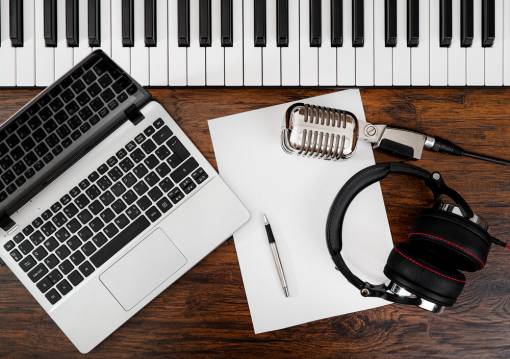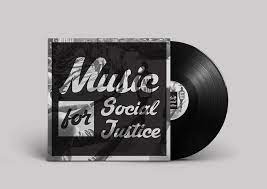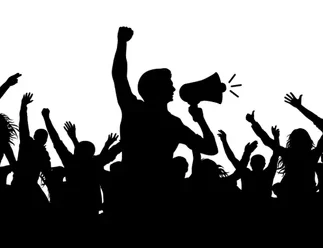How to write compelling songs that pack a political punch and inspire change.
Songwriting is an elusive task. No tried-and-true formula guarantees a good tune, although it is tempting to think so. Even the greatest artists know that songwriting demands patience, resilience, and humility. And if you’re not already humble by nature, writing a song will certainly bring you to your knees. Still, songwriting can be an incredibly rewarding process. You’ll learn a lot, both about yourself and your world, by converting lived experience to music.
The power of a good song is not to be taken lightly. The right combination of melody, harmony, and poetic language has the potential to save lives. When we’re talking about songs written to address injustice and oppressive systems, this is particularly true. From Marvin Gaye’s, “What’s Going On,” to Kendrick Lamar’s, “Alright,” political songs have served as the anthems of protest movements and have empowered millions to get out there and fight for what they believe in. To inspire the activist-songwriters among our readers, we turned to a few artists in the Twin Cities community for their views on writing compelling songs that pack a political punch and inspire change.
Speak your Truth.
The most important quality of any personal creation is honesty. The truer you are to yourself, the more your piece will resonate with others. “You can’t write something raw, something beautiful, unless it’s completely truthful and real,” says Max Lopez, Chicano poet and songwriter from the East Side of St. Paul. “In writing, in general, you really have to have an honest heart when you’re approaching it in order for it to be really, really good.”
Unfiltered honesty also benefits your song’s impact. Your audience won’t appreciate sugar coating when you can call things out as they really are and stay firm in what you believe. Minneapolis rapper and activist, Selah C., says this is at the heart of her songwriting strategy, which draws a diverse demographic of politically involved listeners: “I am a very blunt person when it comes to my music. If it’s something I’m really feeling, I’m just gonna say it how it is. It’s a way to get other people on board with the movement.”
Start with your lived experience.
Let your lived experience be your guide. This can even be true for songs that have no words. In the summer of 2021, when racial tensions were high in Minneapolis following the murder of George Floyd, Jazz drummer, L.A. Buckner, released his single, “Not Today Karen… Not Today,” a whirlwind of a track that blends the rhythmic intensity of djent rock with his jazz/gospel roots. Despite having no lyrics, the subject of the song is made clear by its title, which points to the cultural archetype of “Karen,” the entitled middle-aged white woman often pictured in viral Twitter videos harassing people and seemingly seeking out ways in which to be inconvenienced by others. Evidently, Buckner, a Black man, had had more than a few run-ins with the Karens of his own North Minneapolis community, and he converted his own annoyance and anger into a song. “If I told y’all the stuff I go through, it would sound exaggerated,” Buckner explained to me in an interview on Radio K’s local show, Off the Record. “Y’all wouldn’t believe, every day, just simple little, tiny things… I don’t even get into it. But the music does it for me, the music expresses everything I wanna say.”
Take advantage of the moment.
Inspiration often comes in waves. When you’re feeling inspired or when a melody, hook, or song idea comes to mind, don’t waste any time. Get it down somewhere! Write it on a napkin or on the back of your hand. Hum into your voice-memo app, whatever it is to capture the initial spark. The heat of the moment cannot be replicated, and it often flows from your most vulnerable, impassioned states. Maude Lorr, lead singer of the Minneapolis riot grrl punk group, RiGBY, says that these moments of high emotion are essential in her own songwriting, “It can be hard to connect with it when you’re not in it, or not performing or whatever that looks like.” She approaches songwriting in two main phases: the initial moment of idea purging, and the stage of revision and workshopping that follows. Especially when it comes to songs with a political message, this second stage is very important, Lorr says. You don’t want your tone to be misconstrued, and you want your direction to be clear.
Write for everyone, affected or not.
Songs that incorporate themes of social justice serve two purposes. One is to show solidarity with those affected by the issue. The other is to inform or wake up those who are not. To do both, the politically motivated songwriter must find creative ways to evoke empathy for their cause. Creating empathy does not mean appealing to the interests of the dominant group, but instead showing why the topic of the song is an important one that deserves recognition. Selah C., who often writes songs about the struggles of being Black in the United States, hopes to hold a mirror up to those contributing to systemic racial injustices through her music, “In my lyrics I never in one way bash anybody that wasn’t Black for why Black people are treated bad. I just specifically said this is our truth of what we’re living in. And you can be brave enough to step up and say, ‘you know what, I understand. I sympathize, and if I’ve been a part of the problem, I no longer want to do that.’”
Stay focused on what’s attainable.
A politically charged song does not need to have a monumental impact. Any awareness it raises is a worthy contribution. Placing too much pressure on yourself to be the spokesperson of a movement or of an entire cultural group can interfere with your creative flow.
**Image from https://www.shutterstock.com/search/songwriting**



